Going off-grid with your caravan is a great way to escape the hustle and bustle of busy campsites, save money, and enjoy some peace and quiet around nature. But if you’ve never done it before, it can feel a bit daunting.
In this video, we speak to experienced caravanner Dan Trudgian to get his top tips for caravanning without electric hook-up.
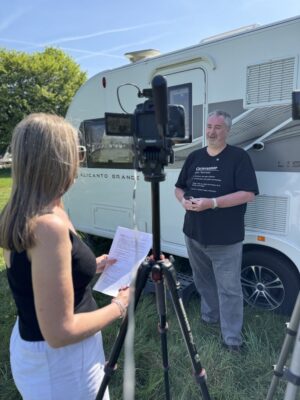
Whether you’re planning a rural retreat or simply want to be a bit more self-sufficient, here is Dan’s expert advice on how to enjoy off-grid caravanning adventures in comfort.
What is off-grid caravanning?
Off-grid caravanning typically means staying on a campsite but without access to mains electricity – and sometimes water – or other facilities found at larger campsites. Dan describes it as “being independent from services” and says it opens up opportunities to stay in more scenic, peaceful locations, like small sites, farm stays, or wild camping-style pitches with quirky amenities.
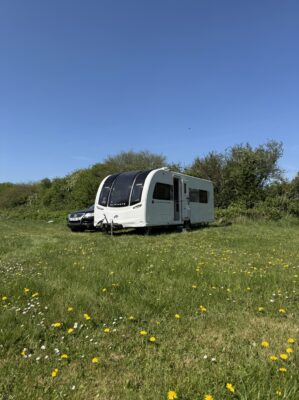
You’ll still have the comforts of your caravan, but you’ll rely on the onboard facilities and equipment to power your stay.
The benefits of off-grid caravanning
Many modern caravans are set up for going off grid, with features like a solar panel as standard, and onboard cooking and washing facilities, like a shower and a loo.
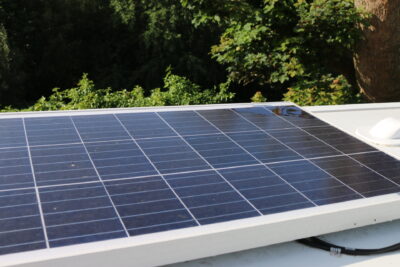
As well as getting away from the hustle and bustle of everyday life, Dan added: “For me personally, well I find it really settles my mental health and it takes you to a rural location where typically a commercial site would never get planning permission.”
Fuel supplies
Your biggest consideration when caravanning off-grid is energy. Your caravan will have two fuel sources – a 12-volt leisure battery and a gas cylinder or two.
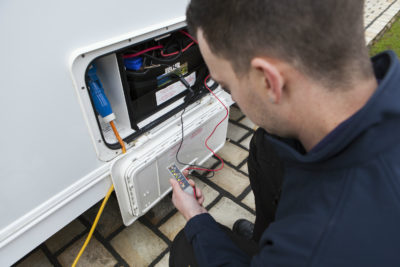
Dan suggests using gas to run your fridge, heat your water, and for cooking.
“Having a good amount of gas is vital,” said Dan. “So always check your gas cylinders before you set off, and consider carrying a spare.”
Dan also carries a small disposable gas canister and a small camping stove as a backup, so if they run out of gas they’re able to make a cup of tea (and even a meal) if needed.
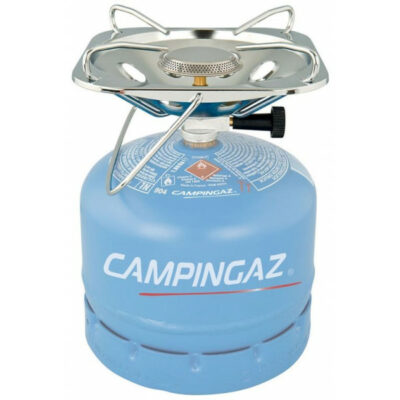
Managing your power when off grid
Power from your leisure battery can be your biggest challenge when caravanning off-grid. Dan talks about “battery anxiety” – worrying that you’re going to run out of power before the end of your stay.
To reduce the worry:
- Make sure your leisure battery is fully charged and in good condition before your trip
- Clean your solar panel so you get as much power out of the panel into the battery
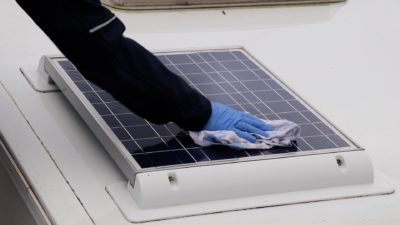
- Consider taking power packs for your mobile phones and tablets
- Switch to LED lights to reduce consumption and always turn off the awning light before bed
- Be conscious of your usage – limit devices, using reading lights, turn down the heating, use timers on your heating and hot water
- Turn the water heater off and boil a kettle for washing up
Dan also takes a large portable power station when caravanning off grid: “They can be quite big and quite heavy but they’re fantastic for providing short bursts of 230 mains voltage into the caravan,” said Dan.
What if something goes wrong?
Dan reassures us that with some prep, there’s nothing to fear.
“Typically, there’s a couple of things that can go wrong when we’re going off-grid in the ‘van – that’s either gas or 12 volts,” says Dan. “Now if you run out of gas, just take your bottle and get a new one. If you run out of 12 volt power it’s a little bit more problematic…”
Some people can plug their caravan into the towing electrics and start the car up to provide some power back into the leisure battery – but it all depends on your tow bar is wired up.
Another option is to see if the campsite provides 12V charging facilities where they will charge up your leisure battery.
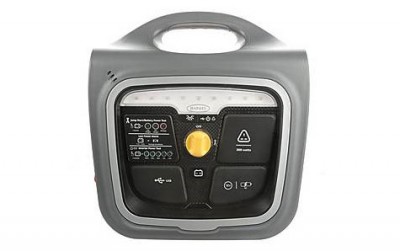
“It’s for that reason that we carry a power station and also a leisure battery charger,” said Dan. “We plug it onto the leisure battery, plug it into the station and recharge our battery.”
What to pack for an off-grid trip
Here’s Dan’s checklist of essentials for a comfortable off-grid caravan break:
- Full gas cylinders (and a spare!)
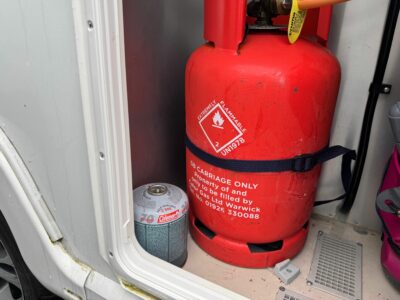
- Power banks
- Extra blankets, hoodies and slippers especially in the colder months
- Levelling kit because off grid sites are often uneven
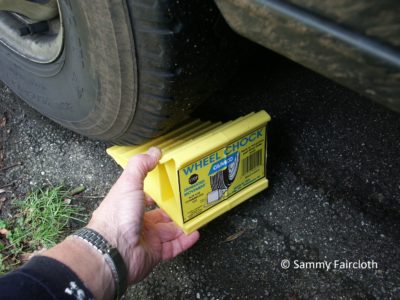
- A head torch
- Eco-friendly toilet chemicals
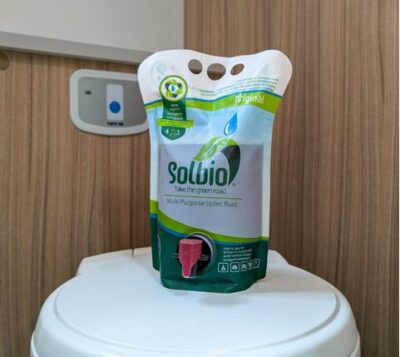
- Antihistamines, insect repellent and bite/tick removal kit
- Stove top kettle
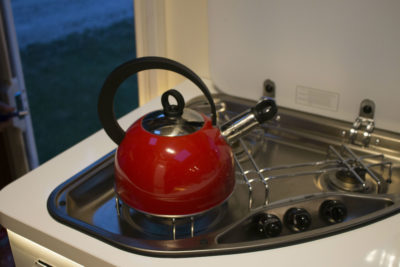
- Freezer blocks and frozen meals
- Disposable gas canister and camping stove for an emergency cup of tea!
And don’t forget there are lots of things you can take out of your caravan before going off grid as anything mains powered that you plug in won’t work.
So leave your electric caravan kettle, hair dryer, air fryer and vacuum cleaner at home and consider a 12V powered TV and sound bar if you use one.
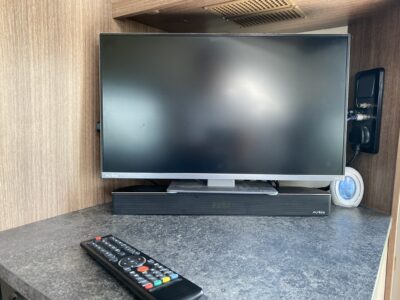
Still unsure about going off-grid in your caravan?
If you’re new to off-grid caravanning, Dan’s advice is to start small. Try one-night stay somewhere close to home, or book onto a campsite that has non-electric pitches. Then if you do run out of power you might be able to move to pitch with electric hook up.
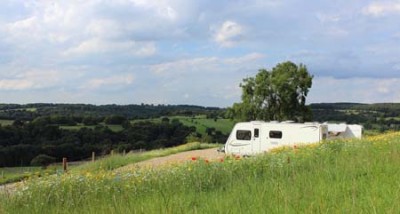
“It will give some confidence and also prove to you that you do have the capabilities to go off grid and hopefully that’ll be the start of your off-gridding adventures,” said Dan. “Also consider the amount of money you’ll save if you go off grid. We’ve been away for a week and spent less than £100 whilst we were off grid using all our on-board facilities”
You don’t need fancy gadgets or a high-tech setup to give off grid caravanning a go – just a bit of planning and a willingness to embrace a simpler touring lifestyle.
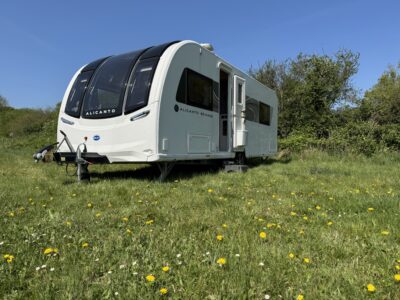
Finally, make sure your caravan is well maintained and that your caravan insurance is up to date. With Caravan Guard’s award winning policy, you can rest assured that you’re covered for your touring adventures, including off-grid stays.


Going off grid opens up a different social world you could join one of the many small social caravaning clubs that rally around village halls or on fields all year around. Such as the TCC touring caravan club https://thetcc.co.uk for more info. Happy caravaning .Off grid is easy, follow this article we have been doing it for years..
Very informative and good common sense advice.
Very useful advice not bean able to camp off grid jue to having to run medical equipment over night and carnt run my generator all night so tret myself to a large capacity soler power station not had canse to use it yet but carnt wate to get off grid